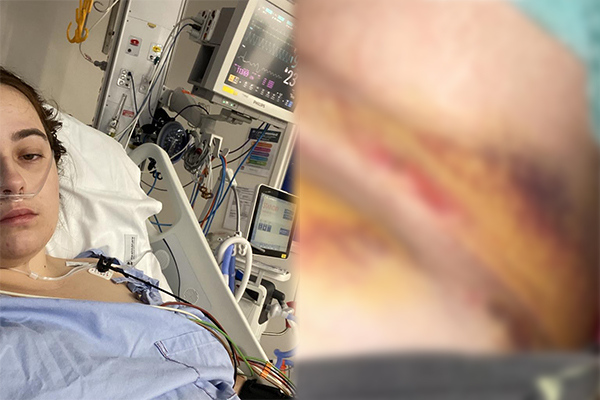A New South Wales woman says she was forced to walk home across the border with broken bones after she was discharged from a Queensland hospital less than a day after a car crash.
Phoebe, 20, was taken to Gold Coast University Hospital with broken ribs, a cracked sternum and internal bleeding after a head-on crash on October 14 near Tweed Heads.
The young woman, who returned a negative COVID-19 test while in hospital, said less than 24 hours after being admitted, she was discharged from the hospital, put in a taxi, and taken to a 7-Eleven service station on the Queensland side of the border.
READ MORE: Police close investigation into AJ Elfalak's disappearance

The taxi driver was unwilling to cross the border and the hospital had not arranged transport services, she said.
From there, she was told to walk over the border into NSW.
Phoebe's mother, Joanne, told 2GB she was disappointed by her daughter's treatment and said she walked to the taxi rather than being put in a wheelchair.
"She had to walk out of the hospital, get in a taxi herself, open and close the door with her broken wrists and ribs, and carry her bags," she said.
Joanne said once Phoebe reached the service station, the taxi driver told her there was no way he could cross the border.
"He said because I won't be allowed back in," she said.
Her mother said the experience left had "tears" running down her face.
Phoebe had emergency service three weeks later, after she experienced major complications.
A Gold Coast Health spokesperson said while staff members understand hospital "can be distressing", they adhere to statewide protocols when treating patients who have been in COVID-10 hotspots to minimise the risk of the spread of the virus.
"These protocols include limiting contact with staff and visitors. Decisions about when to discharge patients from the hospital are based on clinical assessments," the spokesperson said.
READ MORE: NSW Mid North Coast road turns into waterfall after sudden downpour
"While a car accident is considered a traumatic event, injuries vary widely and can range from minor to very serious. Patients with serious trauma injuries have much longer hospital stays than 24 hours.
"Following a trauma incident, patients are assessed to determine their injuries, and investigations such as CT scans and x-rays are used to exclude serious injuries. On arrival at the hospital by ambulance, a trauma patient is reviewed by a specialist trauma team, with other specialist clinicians consulted as required.
https://omny.fm/shows/ben-fordham-full-show/injured-nsw-woman-made-to-walk-across-border-after/embed?style=cover"Discharge plans, including modes of transport, are made in consultation with patients. In cross-border situations, arrangements are sometimes made that involve the patient being taken to an agreed point to be met by family members.
"We encourage patients who have concerns about the care or service they have been provided to contact our Patient Liaison Service so they can be specifically followed up by our team."
